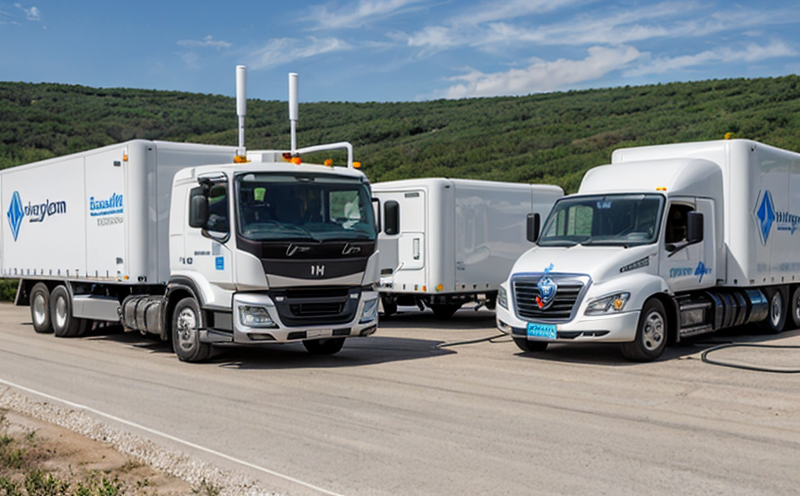EN 17412-2 Electrolyzer Efficiency Testing
The EN 17412-2 standard is an internationally recognized specification for testing the efficiency of electrolyzers, which are critical components in hydrogen production processes. This testing ensures compliance with regulatory requirements and helps manufacturers optimize their products to meet performance expectations.
Electrolyzers operate by splitting water into its constituent elements—hydrogen and oxygen—using electrical energy. The efficiency of these devices directly impacts the overall cost-effectiveness and environmental impact of hydrogen-based fuel production. Testing according to EN 17412-2 helps identify inefficiencies, optimize designs, and ensure consistent performance.
The testing process involves subjecting the electrolyzer under specified conditions to simulate real-world operational scenarios. Key parameters include voltage, current, temperature, humidity, and load. Specimen preparation requires ensuring that the electrolyzer is in a pristine condition, free from contamination or damage. This ensures accurate measurement of efficiency without external variables skewing results.
Instrumentation used for this test includes precision ammeters, voltmeters, data logging systems, and specialized software to analyze performance metrics. The testing setup must be meticulously configured according to the standard’s requirements to ensure reliable data collection. Once the equipment is calibrated and ready, the electrolyzer undergoes a series of tests designed to evaluate its efficiency under varying conditions.
Efficiency is typically measured as the ratio of hydrogen produced to the electrical energy consumed during the process. Acceptance criteria are defined in EN 17412-2 based on specified performance thresholds that must be met for compliance. Compliance with these standards not only ensures product quality but also enhances marketability by demonstrating adherence to international best practices.
Testing according to this standard is essential for manufacturers looking to enter the hydrogen fuel and electrolyzer markets. It provides a benchmark against which products can be measured, ensuring consistent performance across different units produced by various manufacturers. This uniformity fosters trust among buyers who rely on standardized testing results when selecting suppliers.
The process of EN 17412-2 compliance involves regular calibration of test equipment, adherence to strict operational protocols, and documentation of all steps taken during the testing procedure. Continuous improvement in manufacturing processes can lead to better efficiency ratings and lower production costs, making these electrolyzers more attractive for commercial use.
In summary, EN 17412-2 Electrolyzer Efficiency Testing is crucial for ensuring that hydrogen fuel systems are reliable, efficient, and compliant with international standards. By adhering to this standard, manufacturers can produce high-quality products that meet both regulatory requirements and customer expectations.
Competitive Advantage and Market Impact
- This testing provides a competitive edge by ensuring that products meet or exceed international standards.
- Compliance with EN 17412-2 enhances marketability, as it demonstrates adherence to recognized best practices in the industry.
By offering consistent and reliable electrolyzer performance, companies can differentiate themselves from competitors and attract more customers. This testing also supports long-term relationships by ensuring that products continue to meet expectations over time.
Use Cases and Application Examples
| Use Case/Application Example | Description |
|---|---|
| Hydrogen Fuel Production | Evaluating the efficiency of electrolyzers used in large-scale hydrogen production facilities. |
| Research and Development | Developing new electrolyzer models that meet or exceed performance standards. |
| Supply Chain Management | Ensuring that all components used in the electrolyzer are of high quality and meet required specifications. |
| Quality Assurance | Verifying the consistency of product performance across multiple units produced by different manufacturers. |
- Harnessing renewable energy sources like solar or wind to power electrolyzers for cleaner hydrogen production.
- Supporting advancements in fuel cell technology by providing high-efficiency hydrogen as a fuel source.
Eurolab Advantages
EuroLab offers comprehensive EN 17412-2 Electrolyzer Efficiency Testing services that are tailored to meet the specific needs of our clients. Our team of experts ensures accurate and reliable testing results, providing valuable insights into product performance.
- State-of-the-art facilities equipped with advanced instrumentation for precise measurements.
- Dedicated staff with extensive experience in electrolyzer testing and hydrogen production.
- Prompt turnaround times to help clients make informed decisions quickly.
We pride ourselves on delivering services that exceed industry expectations, ensuring our clients have the confidence they need to succeed in their projects.





